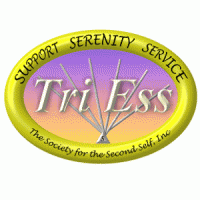Speech at Kappa Beta’s Magnolia Ball (1999)

Source: Dallas Denny is featured speaker at Magnolia Ball. (1999, June). The Pink Slip: The Newsletter of the Kappa Beta Chapter of Tri-Ess, Vol. 10, No. 10, pp. 1, 10.
Ms. Dallas’ Denny, Founder of The American Educational Gender Information Service, was the main speaker at the Magnolia Ball. The following is a summary of her talk.
Ms. Denny began by remarking how much our special edition of The Pink Slip, which recapped Kappa Beta’s history over the past eleven years, caused her to reflect on her role in the beginnings of Kappa Beta, and the changing view of our community over that time period.
Before Kappa Beta, Sigma Epsilon was the only Tri-Ess group in the entire Southeastern United States, and the only other support group in the area was Holly Boswell’s Phoenix group in Asheville. Many of Sigma Epsilon’s members were afraid to meet in Atlanta, so the group often met in Charlotte and Chattanooga. Kappa Beta eventually split off, and Sigma Epsilon stayed permanently in Atlanta.
In the past 10 years we have begun to think about ourselves differently. Fifteen years ago a study at the Gender Identity Center in Colorado found that you had to declare yourself to be either a crossdresser or a transsexual. Once you declared, there were very clear paths you had to follow. If you didn’t follow the correct “script,” you were a failure at your chosen path. There was no middle road. This was still true ten years ago.
The medical community gave us labels over a hundred years ago. In the early 1950s, Christine Jorgenson typified the transsexual role. The medical community expected the transssexuals to transition and fade into society. The other group, crossdressers, were expected to be men who would occasionally don the clothing of a woman. Crossdressers were terrified of exposure. In the 50 exposure as a crossdresser could ruin a person.
More recently these traditional cross-gender paths have blurred. People do not seem to have to make those black/white decisions. We are more able to express gender in any way comfortable to us. There is no right or wrong way. To live full time as a woman, with no surgery, is now O.K. Taking hormones but not transitioning is also O.K.
Dallas discussed a book she had read called The Prehistory of Sex. This book was an anthropological study of sex through the physical evidence presented by artifacts. Anthropologists have found many burial sites on all continents that showed cross-gender roles. There have been literally hundreds of societies which showed evidence of transgender sex roles. Clearly, this phenomenon is not new. It has existed for thousands of years.
She then proposed that today the traditional labels just don’t fit. For example, Virginia Prince calls herself a crossdresser, but she has been living full time as a woman for 35 years, without ever having surgery. Thus, she doesn’t fit either the traditional crossdresser or transsexual mold.
Holly Boswell, founder, in the early 1990s, of the Phoenix group, said in essence, “Why do I have to fit into a category?” She doesn’t want surgery, but lives as a woman. Many crossdressers are experimenting with hormones. Many are living full time without surgery. Dallas also noted that most transsexuals never, for one reason or another, have surgery.
In the 1990s the word transgender is beginning to supplant the traditional words. Transgender is an all-encompassing term which is understood by many people, including academics, the Gay and Lesbian Community, and we ourselves. To us it means there are no failures because of not following “traditional” paths. Transgendered people are those who express gender differently from the traditional two roles.
In society, the John Wayne/Marilyn Monroe roles don’t really fit anybody. It’s not only us who are finding that there are areas in which people are not comfortable in traditional gender roles. Many more people are finding that they are uncomfortable in their clothing, their expected expressions of emotions, their job choices. It is now possible to see that “this whole gender thing is bogus.” Everyone needs to express who they are in their own way.
Our message in the next millennium: We all have to express gender in our own way. Our revolution has a lot to give the world at large. We are not different from everyone else. We express gender in individual ways. It’s not “us versus them.” We need to stop thinking of ourselves as people with problems and start thinking about ourselves as just people.
